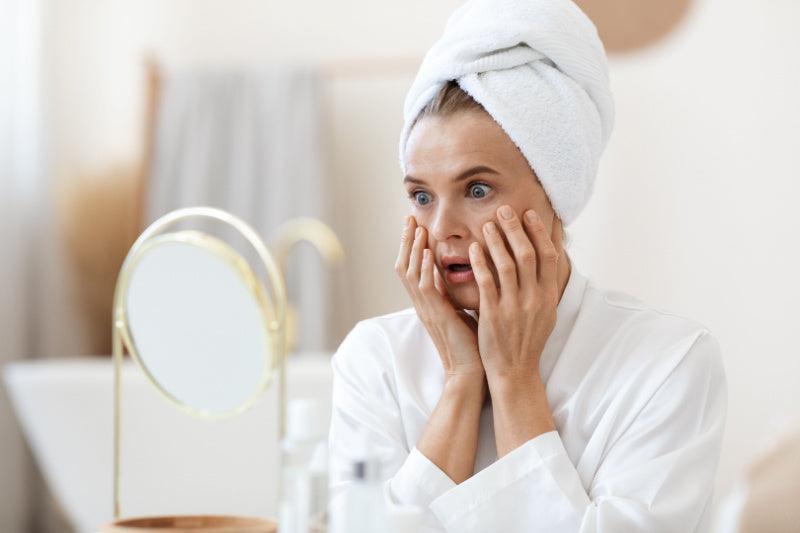
Adulting with Acne (aka Banishing Blemishes)
Adult acne is a common but often misunderstood skin condition that can significantly impact an individual's confidence and well-being. Contrary to popular belief, acne doesn't discriminate based on age, and many adults find themselves grappling with persistent breakouts. In this comprehensive guide, I'll delve into the causes and effects of adult acne, shedding light on its emotional toll, and explore non-medical, non-pharmaceutical treatments that may help you regain control over your skin.
Understanding the Causes of Adult Acne
-
Hormonal Fluctuations: Adult acne is frequently linked to hormonal imbalances. Hormones like androgens can stimulate the production of excess sebum, leading to clogged pores and breakouts. Women often experience hormonal fluctuations during menstrual cycles, pregnancy, and menopause, making them more susceptible to adult acne.

-
Stress: The demands of modern life can take a toll on mental health, and stress is a common trigger for adult acne. Elevated stress levels may contribute to hormonal imbalances and inflammation, exacerbating existing skin issues or triggering new breakouts.
-
Dietary Choices: Research suggests that certain dietary factors may influence acne development in adults. Diets high in refined sugars and dairy products have been associated with increased acne severity. Adopting a balanced and nutrient-rich diet can positively impact skin health.
-
Skincare Products: The use of inappropriate or comedogenic skincare products can contribute to adult acne. Ingredients like mineral oil and certain silicones may clog pores, leading to breakouts. Opting for non-comedogenic and gentle skincare products like those from Adonia Organics can make a significant difference.
Effects of Adult Acne on Individuals
Emotional Impact: Adult acne can take a toll on an individual's mental and emotional well-being. The visible nature of facial acne can lead to feelings of self-consciousness, embarrassment, and lowered self-esteem. Addressing the emotional impact is crucial for a holistic approach to managing adult acne.
Physical Impact--Scarring and Hyperpigmentation: Untreated or improperly treated acne can result in scarring and hyperpigmentation, further affecting one's appearance and confidence. Managing acne effectively from the outset can help prevent long-term skin damage.
The "Don'ts" of Adult Acne
While I am not a dermatologist, here are some general suggestions of things a person should avoid if they have adult acne. (For personalized advice, consult with a healthcare professional or dermatologist).
-
Picking or squeezing acne: This can worsen inflammation, increase the risk of scarring, and spread bacteria.
-
Using harsh or abrasive skincare products: Avoid products with high concentrations of alcohol, benzoyl peroxide, or salicylic acid, as they may strip the skin of natural oils and exacerbate dryness.

-
Overwashing the face: Washing the face too frequently can strip away natural oils, leading to increased dryness and potential irritation. Stick to a gentle cleansing routine.
-
Skipping moisturizer: Even if you have oily skin, using a non-comedogenic moisturizer is essential to maintain skin hydration without clogging pores.
-
Using heavy makeup or comedogenic products: Opt for non-comedogenic and oil-free makeup to avoid clogging pores. Remove makeup thoroughly before bedtime.
-
Neglecting a consistent skincare routine: Establishing a regular skincare routine can help manage acne. Consistency is key when using acne-fighting products.
-
Stress and unhealthy lifestyle habits: Stress and unhealthy lifestyle choices like poor diet and lack of sleep can contribute to acne flare-ups. Manage stress and maintain a healthy lifestyle.
-
Not changing pillowcases regularly: Dirty pillowcases can harbor bacteria and contribute to acne. Change pillowcases at least once a week.
Non-Medical, Non-Pharmaceutical Treatments
-
Proper Skincare Routine: Establishing a gentle and consistent skincare routine is paramount. Use a mild cleanser, non-comedogenic moisturizer, and sunscreen. Exfoliate regularly to remove dead skin cells, but avoid overdoing it, as excessive exfoliation can irritate the skin.
-
Dietary Changes: Adopting a skin-friendly diet can positively impact adult acne. Include foods rich in antioxidants, such as fruits and vegetables, and reduce the consumption of processed sugars and dairy products. Staying hydrated is also crucial for maintaining healthy skin.

-
Stress Management Techniques: Incorporate stress-relief practices into your daily routine, such as meditation, yoga, or deep breathing exercises. Managing stress can help regulate hormonal imbalances and reduce inflammation associated with adult acne.
-
Natural Topical Remedies: Explore natural ingredients known for their anti-inflammatory and antibacterial properties. Tea tree oil, aloe vera, and witch hazel can be incorporated into your skincare routine to help soothe and heal acne-prone skin.
Adonia Organics Blemish Detox

Blemish Detox naturally restores a healthy complexion using a gentle blend of oxygenated plant stem cells, probiotics, and organic botanicals. This serum has been formulated to target adult acne with aging skin. Scarring and the appearance of enlarged pores is common as we age, this serum will help promote the regeneration of collagen and diminish the visibility of pores.
How to Apply

With clean, dry hands, apply on the blemish area twice a day on clean skin. Avoid contact with eyes.
- For existing breakouts with clean hands, apply the serum in a circular motion directly on the affected area. It is preferable to use the serum at night so that it has time to soak into the skin efficiently.
- For blackheads this serum aids in minimizing the appearance of blackheads and pore size. With clean hands, apply a heavy amount throughout the T-zone. Apply both morning and night for best results.
- For enlarged pores apply uniformly over the sections of enlarged pores. Apply at night or to a clean face before applying makeup.
Bidding Blemishes a Fond Farewell
Adult acne is a multifaceted issue that requires a holistic approach for effective management. By understanding its causes, acknowledging its emotional impact, and incorporating non-medical, non-pharmaceutical treatments, individuals can take proactive steps towards achieving clearer and healthier skin. Remember, finding the right balance and consistency in your skincare and lifestyle choices is key to reclaiming confidence and embracing your natural beauty.
